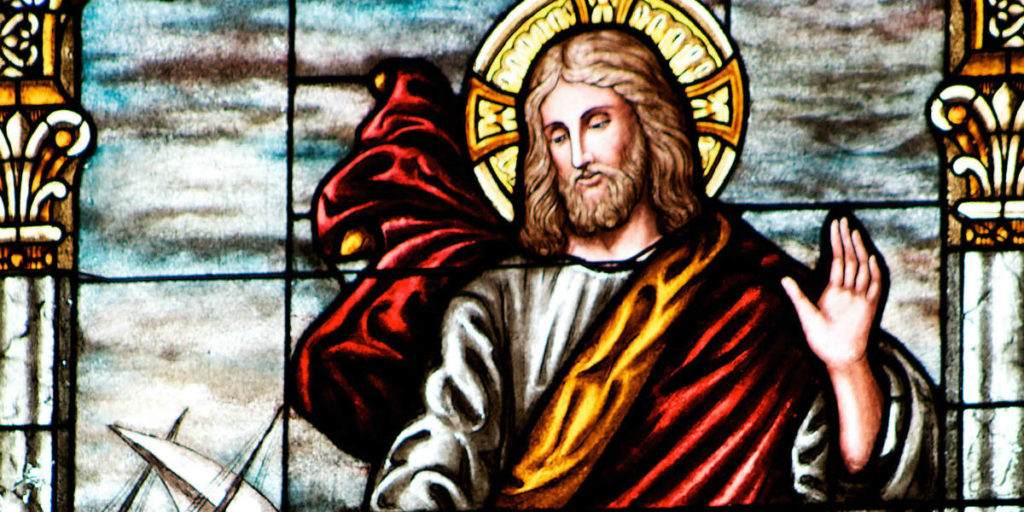
This is a sermon that I preached on Sunday, 5/14/17, at the Washington City Church of the Brethren. The scripture readings for this sermon were: 1 Peter 2:2-10 & John 14:1-14. You can listen to the audio, or keeping scrolling to read my manuscript. (FYI, the spoken sermon differs significantly from the written text.)
Listen to the Sermon Now
I love our gospel reading this morning. I think that the reason I love it so much because I used to despise it. As a skeptical young person growing up in Kansas, this passage from John was one of the Scriptures most often used as a weapon by Bible-thumping Christians. It was a proof text, used over and over again to demonstrate that Jesus is the only way to heaven. It’s used to imply that anyone who doesn’t hold the right beliefs about Jesus is headed straight to hell.
“I am the way, the truth, and the life. No one comes to the Father except through me.” That’s an powerful statement. It’s a phase that has been used so many times to bludgeon people who are seeking, skeptical, and hurting. Those who have doubts. Those who have questions. Those whose experience of the world makes it hard to believe that a loving God would arbitrarily sentence billions of people to unending torment based on something as trivial as whether those people have said a particular prayer or accepted a narrowly defined set of doctrines about Jesus.
“No one comes to the Father except through me.” From the mouths of self-righteous Christians, these words of Jesus sound like a threat. “No one comes to the Father except through me. Don’t even try it. Angry Jesus will stop you.”
For those of us gathered here in this community, we know and bear witness to the fact that this kind of bullying doesn’t represent the character of Jesus. The Jesus we know is the one who came not to condemn the world, but to save it. The Jesus of our experience is a man who was willing to lay aside everything, even his own life, to pour out the unlimited love of God on people who hated him.
That’s very different from the Jesus of the fundamentalists. It’s a different kind of God, one who is more concerned with mercy, transformation, and wholeness than with being right. This is the kind of God we meet in Jesus. He challenges the violence of the mighty and the self-righteousness of religious people. He shows shocking love and forgiveness to those whom the world judges as outcasts and sinners.
As we heard in our scripture reading this morning from first Peter, Jesus is the stone that the builders rejected. He was rejected, despised, and discarded by the builders. But he has become the chief cornerstone, the key that unlocks the cosmos. The greatest minds and most powerful rulers considered him to be worthless, but God has revealed him to be essential. Jesus is this “living stone… rejected by mortals, yet chosen and precious in God’s sight.”
Are we to believe that Jesus has come to present us with capricious threats and ultimatums? He is the rejected cornerstone, nailed to a cross by all the best and brightest. Is he here to threaten those who don’t meet the religious tests of modern day Pharisees?
“I am the way, the truth, and the life. No one comes to the Father except through me.” Anyone who repeats these words as a threat is no friend of Jesus. To interpret these words as a message of condemnation makes Jesus into a Pontius Pilate rather than a liberator. It turns him into a tyrant and a torturer rather than a savior worth abandoning everything for.
Jesus brings us good news of the kingdom. Jesus brings us freedom from slavery and fear. Jesus comes so that we might have life, and have it more abundantly.
So how are we to understand these words of Jesus? If they’re not a threat, what does it mean when Jesus says that no one comes to the Father except through him?
In order to understand most anything in the Bible, it’s important to zoom out a little bit. Context matters. If Jesus were saying these words while sitting on his heavenly throne, reigning in judgment – like he is depicted in Matthew 25 – that would impact their meaning. So what is the situation here, when Jesus says there’s no way to God but through him?
It turns out, these words of Jesus are part of a love song. Really! Let’s take a look at what Jesus was saying to the disciples right leading up to this.
Jesus said, “Do not let your hearts be troubled. Believe in God, believe also in me. In my Father’s house there are many dwelling places. If it were not so, would I have told you that I go to prepare a place for you? And if I go and prepare a place for you, I will come again and will take you to myself, so that where I am, there you may be also. And you know the way to the place where I am going.”
Back in Jesus’ time, there was a proper way to go about getting married. When a man asked a woman to marry him, if she and her family agreed, they would announce the engagement. But before they actually got married, the husband-to-be had some preparation to do. In ancient Palestine, it wasn’t like today, where newly married couples are generally expected to move into their own residence. In Jesus’ day, families were much more tight-knit. The whole family lived together. So when a woman married a man, she literally joined her husband’s extended family.
In order to make room for the new couple, it was typical for the husband-to-be to go home and build an addition onto his parents’ house. Once the construction was complete, he could go back to wherever his fiancee was and marry her. The room was prepared. They had a place to live together, under the same roof with the man’s whole extended family.
So let’s hear the words of Jesus again: “In my Father’s house there are many dwelling places. If it were not so, would I have told you that I go to prepare a place for you? And if I go and prepare a place for you, I will come again and will take you to myself, so that where I am, there you may be also.”
Jesus is proposing to the disciples! Now, some people might say this is kind of creepy – proposing marriage to twelve people at once. And if he was, in fact, proposing to all the people of the world – well, that would make Jesus the greatest polygamist of all time.
But once you get past the weird, “Jesus is my boyfriend” aspect of this scene, it’s actually kind of amazing. Jesus isn’t standing in judgment. He’s inviting us into an intimate relationship with him. He’s proposing that we come to live with him, as part of his Father’s household, together with the whole family of God. Jesus is singing his love song.
Have you ever played that game? You know, the one where you start flipping through the radio and try to guess in the first two seconds of a song whether it’s a pop ballad, or a praise song? I mean, I don’t know if you’ve listened to the radio lately – but have you noticed how similar praise music and love songs are? A lot of times I have to wait until I hear the words “baby baby” before I can tell the difference.
But seriously, I think this points to something important. What if our relationship with God is less like a test to be passed and more like a romance to participate in? What if following Jesus is less about having the right answers, and more about giving ourselves over to a relationship and a community bigger than ourselves?
Jesus tells the disciples that he’s leaving to go prepare a place for each of them in his Father’s house. Then he tells the disciples, “You know the way to the place where I am going.”
Thomas, who we know is the skeptic of the group, objects. “We have no idea where you’re going! How are we supposed to find the way?”
And that’s when Jesus says it: “I am the way, the truth, and the life. No one comes to the Father except through me. If you know me, you will know my Father also. From now on you do know him and have seen him.”
Like most religious people, Thomas was being very task-oriented in his faith. He wanted a method, a map, a set of rules and steps that would get him where he was going. But in response to his demand for a roadmap, Jesus points him to relationship. “Look at me, Thomas. Look at me. I am the way. If you’ve seen me, you’ve seen the Father. You don’t need to keep looking. Rest in my love.”
“I am the way, the truth and the life. No one comes to the Father except through me.” All this time you’ve been looking for a system, or a set of rituals, or a test to pass that will give you connection to God. But you’ve been missing the reality who is standing right in front of you. Look into my eyes, Thomas. You haven’t really seen me yet. If you can finally see me for who I am, you’ll know the Father.
There’s a singularity in Jesus. Like his Father, Jesus is who he is. There’s no substituting for him. There’s nothing that can replace a real relationship with him. No one comes to the Father except through a genuine relationship with Jesus. We can’t just speak the right words, or have the right beliefs. We’ve got to look into his eyes. We have to experience his love. We have to see him, really see him, if we want to see the Father.
Now, I want to do something that is maybe a little silly. You remember how I said that I often have a tough time telling the difference between love songs and worship music? Well, a good example of this is the song “Only You,” by The Platters. This song came out in 1955, and it was hugely popular. It was played on jukeboxes everywhere. I’m sure you’ve heard it.
Right now, I want to invite you to hear this song again, in a fresh way. Let’s hear it as a love song to Jesus, as a reflection of the kind of passionate, personal, intimate love that he expresses for each of us in our reading this morning.
Only you can make all this world seem right
Only you can make the darkness bright
Only you and you alone can thrill me like you do
And fill my heart with love for only you
Only you can make all this change in me
For it’s true, you are my destiny
When you hold my hand I understand the magic that you do
You’re my dream come true, my one and only you
Only you…
Amen.
